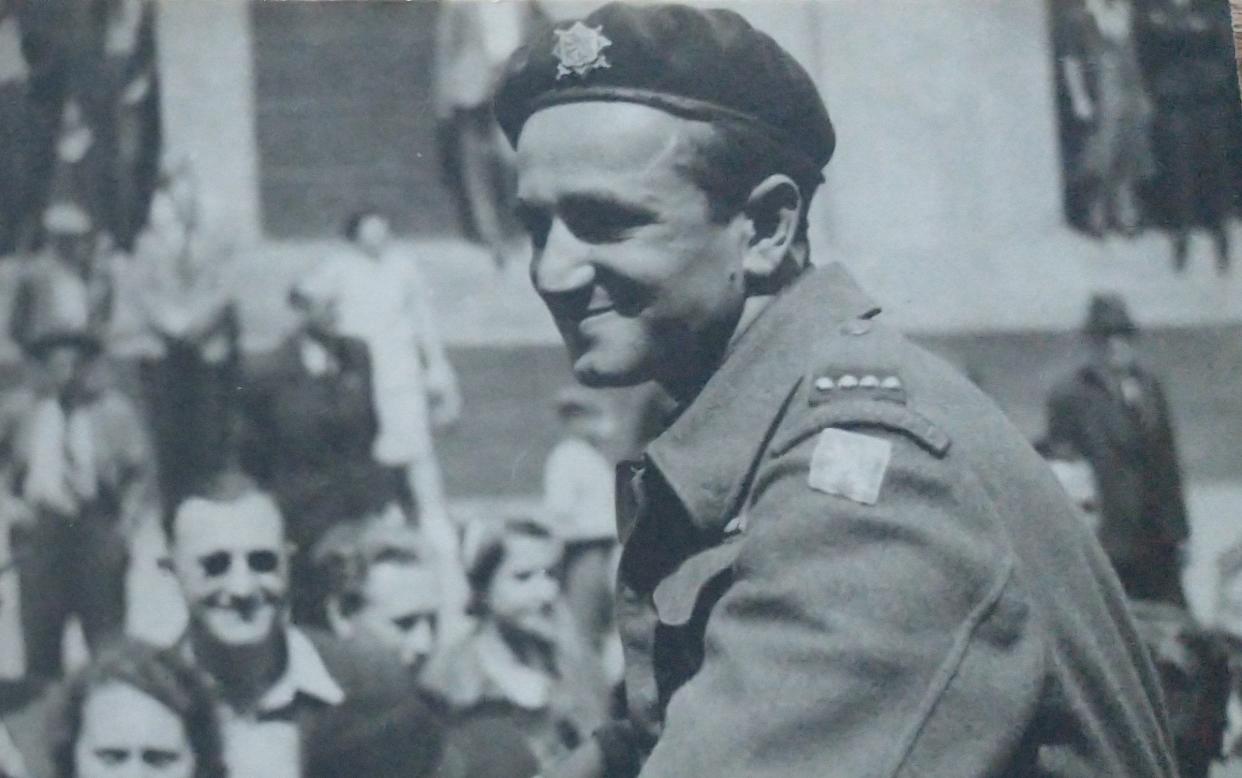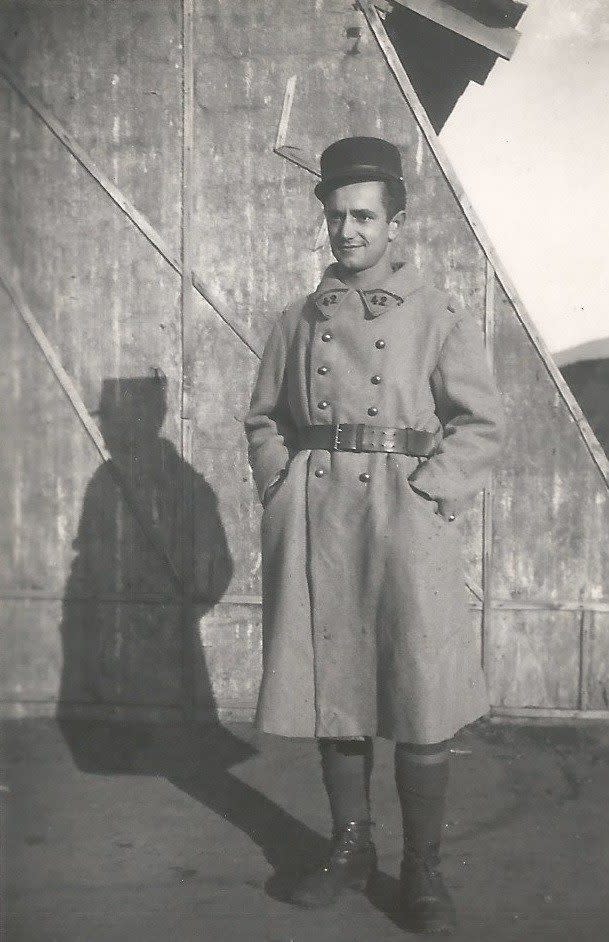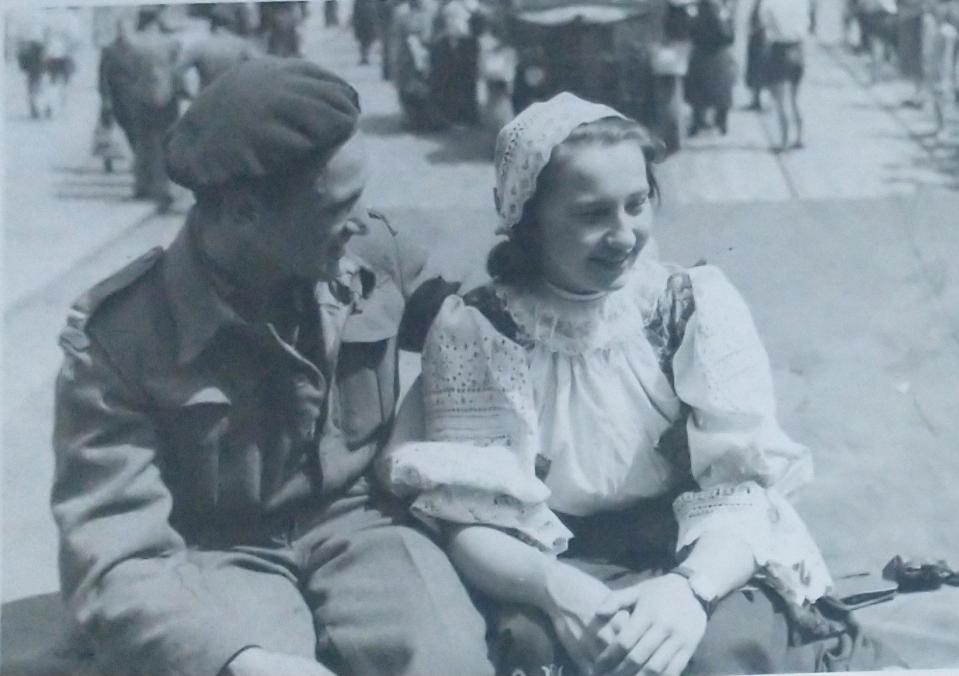Ervin Hoida, Czech soldier decorated for his tank service in 1944 who settled in Britain – obituary

Major Ervin Hoida, who has died aged 105, was one of the last Czechoslovak veterans of the Second World War living in Great Britain.
In August 1944 Hoida, serving with the Tank Battalion, part of 1st Czechoslovak Independent Armoured Brigade Group (1 CIABG), landed at Arromanches on the French coast. His unit was attached to the 1st Canadian Army, which was laying siege to the German fortress at Dunkirk.
The garrison proved most resilient and by early October, it became clear that the fortress could not be taken without a full-scale assault. The major Canadian units were redeployed and 1 CIABG took over the siege.
This led to a series of attacks, counter-attacks and skirmishes in No-Man’s Land. Hoida took part in numerous three-man patrols in an attempt to capture a German soldier for interrogation. The Czechs wanted to assess the state of morale in the fortress and the amount of food and ammunition that the garrison had left. German recce patrols were also seeking information, probing for weaknesses and trying to ascertain the strength and disposition of the Czechs.
On one of these sorties, in the darkness, Hoida’s sergeant stepped on a mine. The noise set off a hail of bullets from both sides, firing on fixed lines. Hoida and his comrade carried the man through withering crossfire back to their base. On arrival, however, he was found to be dead. Hoida was awarded the Czechoslovak War Cross.

Ervin Hoida was born at Ostrava, Czechoslovakia, on November 30 1918 to Jewish parents, Ferdinand and Frantiska (née Enochova). His father was a successful businessman. Young Ervin, who had two elder brothers, attended high school but his studies were interrupted by the financial crisis of 1932. He graduated from the State Vocational School for Wood Processing and worked as a draughtsman at Krnov before getting a job at a furniture factory in Prague.
After the annexation of the Sudetenland by Nazi Germany, followed by the occupation of Moravia and Bohemia, his parents made plans to leave the country. They boxed up all their possessions and sent them to England to be stored in a warehouse but the building was bombed and they lost everything. With the help of the Zionist movement, they reached Haifa, Palestine, but they were not allowed to leave the ship, which sailed on to the island of Mauritius, where they were interned.
Hoida and his brothers, meanwhile, with their wives, travelled to Italy on temporary study visas. When these expired, he bribed some fishermen to help them cross the French border under cover of darkness. They were challenged by a French patrol boat but he threw himself flat on the deck, crawled under a tarpaulin and was not discovered.
On reaching the coast of France, he waded ashore in the only clothes that he possessed and took a bus to Nice. Still soaking wet and unable to speak a word of French, he stopped a policeman and said: “Czechoslovak Consulate!”
It was reckless because his brothers and their wives had been caught and imprisoned. He could have been arrested but the man took him to the consul, who gave him money and papers to enable him to get to Marseille.

From there, he shipped to Algeria and enlisted in the Foreign Legion at their depot at Sidi Bel Abbès. A few weeks later, he joined the 1st Infantry Regiment Czech Army on the front line north-east of Paris. He was equipped with a First World War rifle and only eight cartridges.
The force, completely overwhelmed by the mobility and firepower of the Germans, fought a rearguard action from river to river as it withdrew southwards. At Gien, the bridge over the River Loire was destroyed and he had to swim across. The boat carrying rifles and boots was strafed by a Stuka and sunk. He took a rifle from a dead soldier but he had to complete the rest of the long march in his bare feet.
After the fall of France, his brothers remained in the country but he reached Gibraltar and got a ship to England. After treatment in hospital for his feet, he joined some 4,000 Czech soldiers and airmen in a tented camp in the grounds of Cholmondeley Castle, Cheshire. He was posted to the 1st Infantry Battalion within the newly established Czechoslovak Mixed Brigade and, after taking a tank driver’s course in summer 1943, he was transferred to 1 CIABG’s Tank Battalion.
During this time, he met and married Isabel Lucas who was working in a department store in Manchester. He volunteered to be dropped by parachute into his enemy-occupied homeland but when it emerged that he was married he was not allowed to go. Ten of his comrades took part in the operation. One was discovered to be a traitor, and they were all killed.
By D-Day, his battalion’s tanks had not yet been adapted for the water, and he had to wait until repairs to the Mulberry harbour at Arromanches had been completed before embarking for France.

After the German surrender on May 7 1945, fighting continued in Prague for several days before the German forces left and the Soviet Red Army arrived. Hoida and his tank crew reached the border with Czechoslovakia but were not allowed to go any further. Following the Yalta Conference, the country had fallen under the Soviet sphere of influence and they had to give up their tank and weapons.
He ended the war in the rank of staff sergeant but, after he was demobilised, he found it impossible to get work without being a member of the Communist Party. His wife had joined him but she returned to England. In March 1946, he travelled to the French port of Le Havre as a member of the United Nations Relief and Rehabilitation Administration and got a job servicing Army lorries before rejoining his wife in England.
They settled in Birkenhead, near Liverpool, and he worked for a company that designed and manufactured interior furnishings for luxury ocean liners. He subsequently became a director of a company based at Worcester which made hi​gh-quality reproduction furniture. His parents eventually reached Israel.
After retiring in 1983, he and his family lived in Spain for 12 years before he finally settled in the Wirral. In retirement, he travelled extensively. He was a lifelong supporter of Liverpool FC.
Ervin Hoida married first, in 1943, Isabel Lucas, who died in 1997. He then married Lena Binks in 2005 and she survives him with a son of his first marriage. Another son also predeceased him.
Major Ervin Hoida, born November 30 1918, died February 14 2024​

